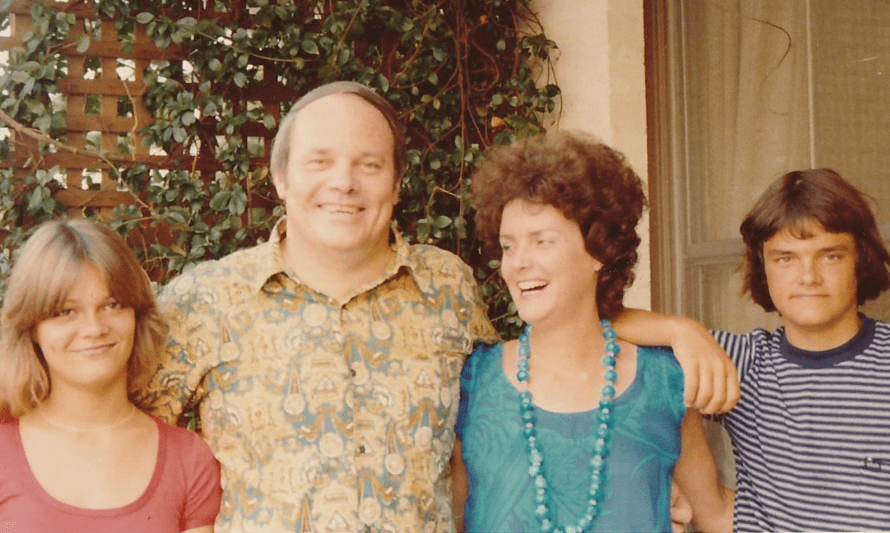
50 years of changing lives by The Shepherd Centre.
We are delighted to provide this inspiring exhibition showcasing children and their families who have overcome incredible challenges with the help of The Shepherd Centre.
The collection below tells their stories, highlighting their pivotal moments of hearing loss diagnosis, the revelation that they were not alone, hearing their first sound, speaking their first word and the relief that everything will be okay.
Sadly, one in two children with hearing loss in Australia is still not getting access to a specialist service.
Your support will help us continue our mission to ensure families and children with hearing loss access these vital services.

Tiger was diagnosed with auditory neuropathy spectrum disorder at just five weeks old.
His mother, Rachel, found comfort and support when she joined The Shepherd Centre.
With their guidance, she received the encouragement, education, and confidence to make the life-changing decision for Tiger to receive cochlear implants.
Early intervention has been crucial for Tiger and his family, equipping them with the tools to help him communicate effectively and explore a world full of possibilities.

Stephanie’s journey into the world of hearing loss support, like many parents, began with a sense of overwhelm.
But when she discovered The Shepherd Centre, it became a lifeline—empowering her to support her son, Bruce, and building her confidence to advocate for him.
With The Shepherd Centre’s guidance, Stephanie embraced Bruce’s unique ‘crazy and funny’ personality, while showcasing what’s possible for a child with hearing loss.
Their story highlights the transformative power of early intervention, demonstrating the importance of accessing the right resources, combined with love and determination.

At just six months old, Frankie was referred to The Shepherd Centre for early intervention.
The Shepherd Centre supported her family every step of the way—providing pre-surgery counselling, post-surgery checks, and cochlear implant activations—first in her right ear in 2018, then in her left ear in 2020.
At the time, Frankie’s family didn’t live near a centre, making The Shepherd Centre’s telehealth services and outreach visits invaluable.
Now, with dedicated on-the-ground support in Tasmania, children like Frankie can access the essential in-person care that all deaf children deserve.
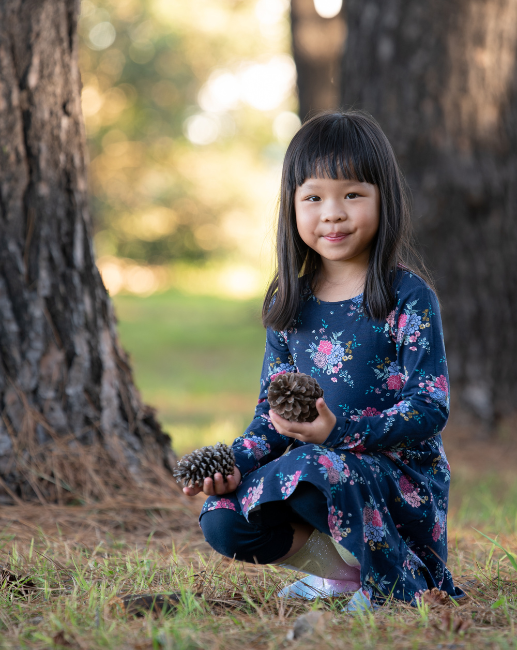
Mae was diagnosed with mild bilateral sensorineural hearing loss when she was just six weeks old and she was fitted with hearing aids at two months. Mae’s parents had doubts about whether she would talk properly or attend a mainstream school because they didn’t know anyone with hearing loss. Now Mae is in primary school, and she loves it. She loves to draw and is always doodling. She loves to read, write poetry, listen to music and has started piano lessons.
Her mum Nga says, ‘Her teacher says Mae consistently shows empathy and compassion towards others. That’s a direct result of her time at The Shepherd Centre. Now our hope is that Mae will not only speak English, but Vietnamese as well – which is where my husband and I were both born.’ She adds, ‘The Shepherd Centre has given us so much. We had a lot of uncertainty when we arrived. To now see Mae starting to reach her full potential is just amazing. What I’ve come to love about The Shepherd Centre is the holistic approach to early intervention. They don’t just focus on the hearing loss and the child, but the whole family as well.’

Here Aya, who has been attending The Shepherd Centre temporary clinic since February 2021, enjoys the Acoustic Skills Group, a music therapy program that supports children’s listening development and early social skills.
The Shepherd Centre is opening a brand new, state-of-the-art centre in Macarthur to support children with hearing loss and their families in South West Sydney. The Macarthur region is severely under-serviced, and there is currently no specialised service based in the area to support children with hearing loss. The Macarthur centre will be established as part of the new Oran Park development near Camden, and the new centre will open to families in 2023. In the interim, we continue to provide services from our temporary clinic in the area.
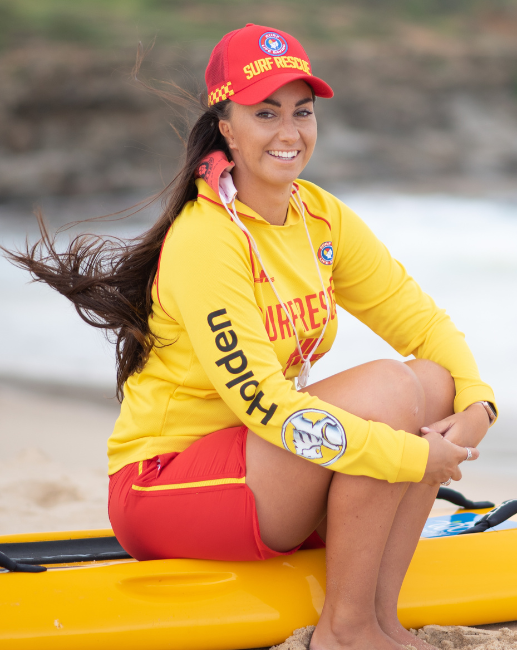
‘I was born deaf with no ears or ear canals,’ says Shannon. ‘I had everything in the middle but nothing on the outside. On the recommendation of the Ear Nose and Throat specialist, my parents contacted The Shepherd Centre. They realised I was going to have a lot of trouble learning to hear and speak and they were keen for me to attend a mainstream school. I remember lessons at The Shepherd Centre: I remember doing crafts and being put through different types of sound and talking tests. I’ll be forever grateful for the time I spent at The Shepherd Centre.’
Because of her type of hearing loss, Shannon was later fitted with a bone-anchored hearing aid (Baha) when she was 13. Growing up on the south coast of NSW, Shannon has led an active, outdoor life, with sport playing a key role in her development. Shannon is also a Surf Lifesaver and was the first female for over 100 years to be elected as Club Captain at her club. ‘It’s become a big part of my life,’ says Shannon.
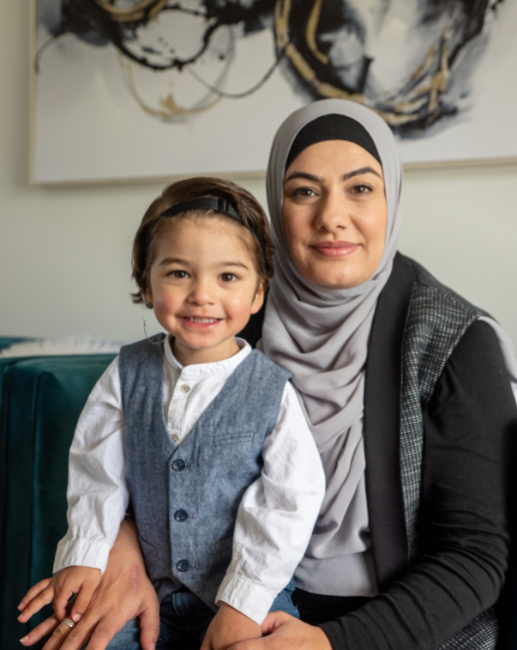
Rosanna took her son Tariq to The Shepherd Centre when he was born with Microtia Atresia. This is a congenital condition where the external ear and ear canal are underdeveloped. It left Tariq with severe hearing loss in his right ear and moderate loss in his left ear. ‘I just knew I needed support; I needed help with Tariq’s speech. I needed to connect with other families in a similar situation, and I found it all at The Shepherd Centre,’ said Rosanna. Seeing her son’s progress has been a source of immense pride. She has watched him grow from a shy baby into a boy full of confidence.
Rosanna was so grateful for the support she received from The Shepherd Centre that she agreed to be the face of the campaign to raise funding for the new Macarthur Centre. Tariq will be in school by the time the Macarthur Centre is built, but this only makes her more determined to support the campaign, so everyone can access their services. ‘I know other families are further away from Liverpool than me, families out as far as Camden, who would benefit tremendously from a local centre. There are so many people in this area now – we desperately need a local Shepherd Centre.’
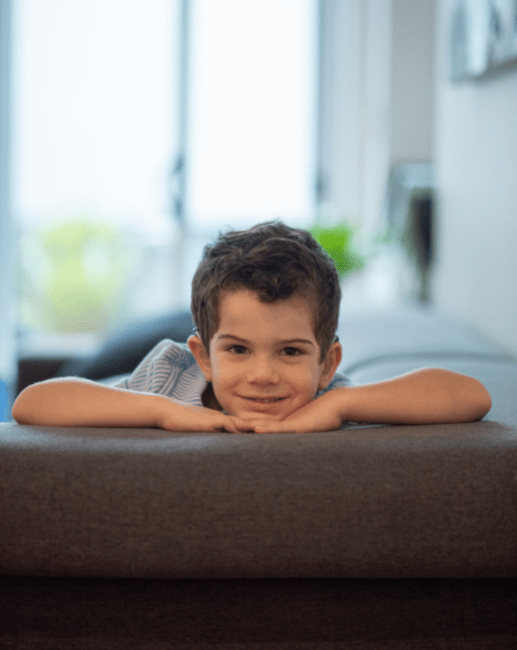
After graduating from The Shepherd Centre, Eden was enrolled into a mainstream school. On his first day, mum Michelle was walking him through the playground, and a boy wearing glasses came up to Eden, pointed to his hearing aids and said, ‘What are those things on your ears?’ Without being phased at all, Eden said to him, ‘just like you wear glasses because you can’t see, I wear hearing aids because I can’t hear.’ They’ve been friends ever since.
‘Of course, we were shocked when we found out about Eden’s diagnosis,’ says Michelle, remembering the feeling of devastation she and Adrian felt, ‘but we had to move forward. We went to the Newtown Centre for five years and did all the programs. Meeting other parents going through the same thing was a gold mine. And his Therapist, Lisa, was beyond amazing. She was incredibly patient with Eden, and she taught me to be Eden’s advocate as he approached the time to go to school.’ Michelle adds, ‘The Shepherd Centre is so unique. With early intervention, children’s speech is now clear. They can attend their local school, and it is becoming something that can be looked at like glasses. I feel blessed to have Eden as a role model for future kids who have the hearing loss journey ahead of them.’
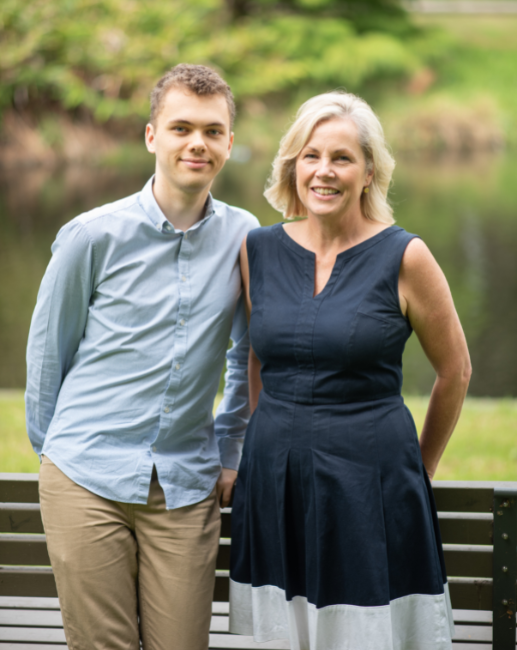
In 2017, at 17 years old, Hamish stood up in front of our elected politicians in Canberra and spoke with amazing confidence about the hurdles he was forced to straddle. His parents, Charles and Fiona, watched as their son held centre stage – their stomachs churning, tears flowing, and an elevated sense of pride. ‘His hearing loss wasn’t diagnosed until he was eight months old,’ recalls Fiona, ‘and then it was only because I noticed he wasn’t responding to us the way I thought he should. The day we walked inside The Shepherd Centre changed our lives.’ Hamish was later diagnosed with bilateral profound hearing loss and received two cochlear implants.
Fiona and Charles realised it would take a concerted family effort to help Hamish fulfil his potential. They agreed Fiona would give up work and devote her full attention to their son. ‘I treated Hamish’s speech as my job,’ says Fiona. Hamish recalls ‘In actuality, there’s a lot of hard work and rehabilitative therapy involved, especially on behalf of the parents. My parents kept a notebook of every single word I said for two years. Without them, I would never have been able to make a speech. And without The Shepherd Centre, they would never have been able to help me along this path in the first place.’
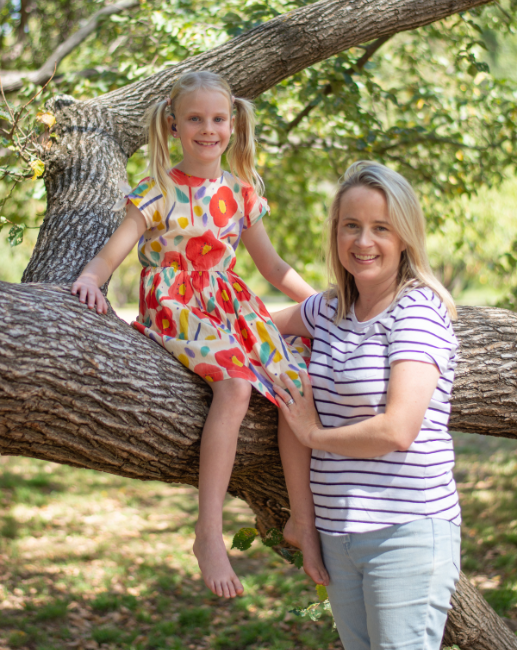
Claire Foote remembers watching morning TV and there was a segment about The Shepherd Centre. She recalls, ‘It was the day we learned we didn’t have to do this alone.’ Just a few days before, Claire and her husband Rob were told Annabel had bilateral moderate hearing loss. ‘Annabel was just five weeks old, and it was picked up during the newborn hearing screen test. She’s our only child with hearing loss, and there’s no history of it in either of our families. Those first weeks were tough; it was such a shock.’
Annabel was enrolled into The Shepherd Centre at nine weeks of age. ‘I loved the optimism of The Shepherd Centre,’ says Claire. ‘In our first meeting, they told me about some of their incredible outcomes. I liked that their program was adjusted to suit Annabel rather than expecting her to fit into a program’. Annabel is now excelling in the classroom and the schoolyard. She loves reading and writing stories, plays netball and touch footy. Claire admits she struggles to put into words the impact The Shepherd Centre has had on the lives of her daughter and her family. She says, ‘They just “got her” – every session was tailored to Annabel’s interests and challenges.’
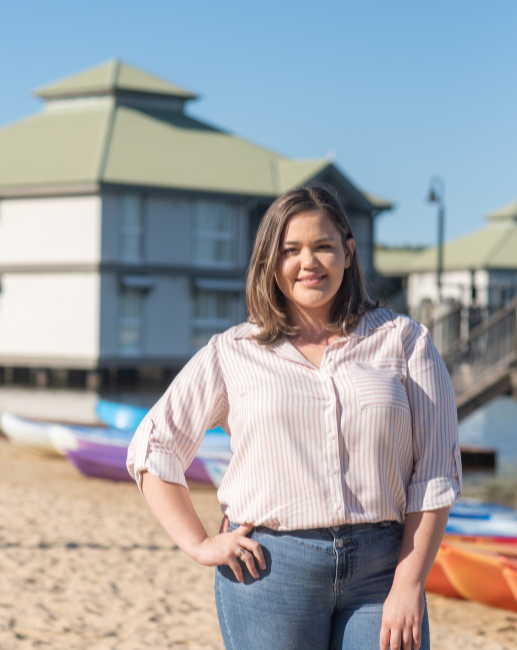
Grace Jakeman was born a healthy, hearing child, the second daughter of Miles and Le-Anne and baby sister to Elise. At 21 months old, she acquired a severe kidney infection and was prescribed a series of strong antibiotics; its possible that this medication led to her hearing loss. But it wasn’t until she was three years and nine months old that her family received the diagnosis and had her fitted with hearing aids. They were referred to The Shepherd Centre. ‘The diagnosis brought a whirlwind of emotions,’ says mum Le-Anne. ‘The Shepherd Centre gave us hope when we were quite bewildered. We had already battled several medical issues with Grace, and this was another challenge in her short life that The Shepherd Centre helped us navigate.’
Grace has grown to have a love of music and dancing. Her confidence grew significantly throughout her school years, and she’s now at university, where she’s studying nursing. The family are so grateful to The Shepherd Centre. Le-Anne says, ‘Their guidance, support, and empathy allowed us to normalise Grace’s situation and provide positive and beneficial tools for Grace’s future. Grace’s confidence has held her in good stead throughout her schooling, into her university education and the workplace.’
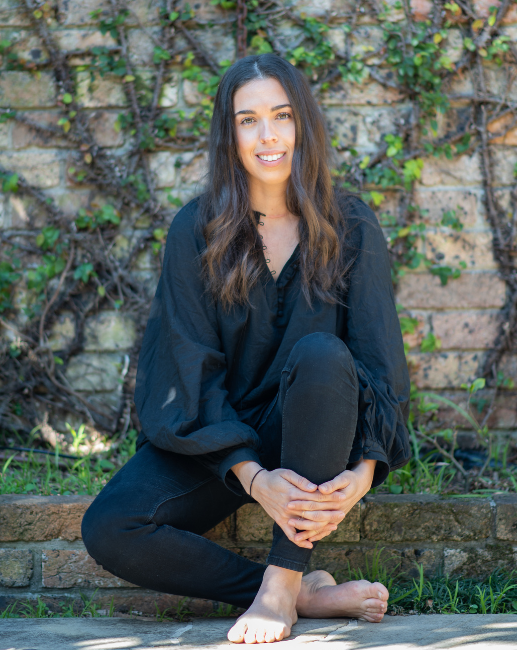
The odds appeared to be stacked against Rosie Gallen. Doctors failed to diagnose her hearing loss at birth, and she lived in Gunnedah, more than six hours west of Sydney. ‘The doctors declared me to be a healthy and happy baby at birth,’ says Rosie. ‘A number of times I was taken to the GP and each time, my parents were told there was nothing wrong. It wasn’t until getting totally frustrated that they took me to a specialist in Sydney, and it was only then that they were told I was profoundly deaf.’ Rosie’s parents were determined to give her the same opportunities as her older sisters, and they contacted The Shepherd Centre. Rosie was fitted with hearing aids, and the lessons began.
‘The staff were incredibly supportive and encouraged my family all the way,’ Rosie recalls, ‘I remember every afternoon I would sit at my little desk at home and practice my sounds, letters – anything to do with language and speech development. I believe this was instrumental in what I’ve achieved and how far I’ve come, and I’m pretty proud of it.’ She adds, ‘It was a lifeline for me and my family, to come across such an incredible organisation that helped me prove all those people wrong; all those people who said I would never speak nor hear; it was a blessing. It’s enriched my life, and it can do exactly the same for you.’
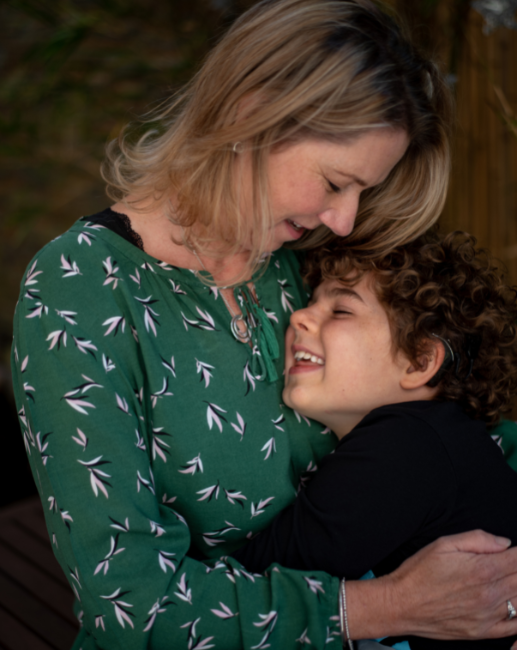
We all dream of sharing our passions with our children, but what if your passion is music and you’re told your baby has scored zero on the hearing test? That was the news presented to Jo and David Williams when Felix was born. Jo remembers the feeling of warmth she received from that first phone call to The Shepherd Centre: ‘I spoke to a staff member who said, “You must be really struggling at the moment. We’re here to hold your hand if you’d like us to.” And that was that.’
Felix was just four months old when he was fitted with two cochlear implants. He excelled in developing his spoken language and listening skills and graduated from The Shepherd Centre at age five, discovering music at home and at school. Jo says with a beaming smile, ‘David taught him some basics, and he learned to read music and loved it. One day at school, a guitar teacher gave a lesson, and Felix fell in love with that. I think part of it was because the teacher was playing rock music. Up until then, he’d been playing classical music. He learnt the rock music tune that day.’ She adds, ‘When Felix got his cochlear implants, we were told he probably wouldn’t know the difference between the notes that were close together. But he does.’ Now Felix sometimes busks down at his local shopping centre over the holidays. ‘It’s not just his ability to play music that amazes us,’ says Jo, ‘it’s also his confidence.‘
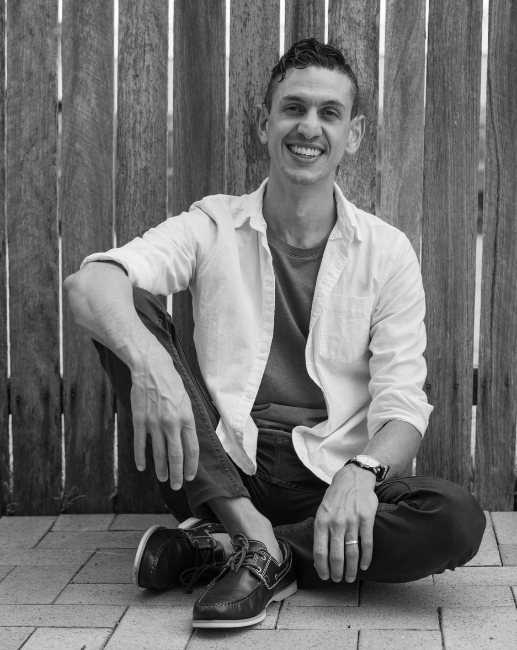
‘I was initially told that nursing was not a suitable career for an individual with a hearing impairment,’ says Anthony. His journey began just after he turned three, when he was diagnosed with a congenital malformation of the cochlear. ‘I had hearing aids in both ears by the time I was four, and then when I turned 16, I had a cochlear implant in my right ear when doctors noticed further deterioration of my hearing.’ Anthony credits The Shepherd Centre for much of the success he’s had in his life. Not just because they worked with him, but because of the help they gave his parents. ‘Beyond their commitment to fostering speech and auditory training for children,’ he says, ‘it was the family-centred empathetic care from The Shepherd Centre that played a large part in helping my parents to help me.’
Anthony completed a Master of Nursing, graduating with first-class honours. Following intensive care training, Anthony took a post at the Alfred Hospital as a clinical nurse specialist within the Trauma Intensive Care Unit, providing life-sustaining therapies to victims of trauma and their families. The child who was told he wasn’t suited to a career in nursing is now also the Postgraduate Course Coordinator for the Master of Intensive Care Nursing Course at La Trobe University, a lecturer in the School of Nursing, Midwifery and Paramedicine at Australian Catholic University and a Clinical Educator at the Alfred Hospital’s Intensive Care Unit.
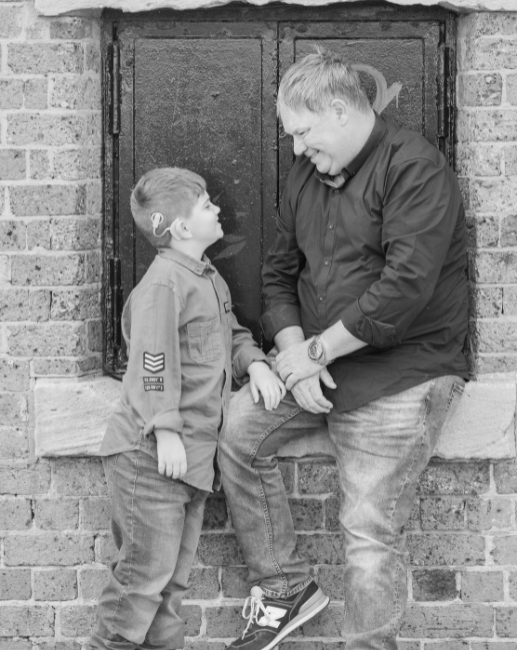
Connor Tubridy was born with profound hearing loss. Getting him into The Shepherd Centre’s Early Intervention Program was an obvious choice for his parents, Sean and Rebecca. They had both attended the Centre in the early 1970s. ‘Like Connor, I have profound hearing loss,’ says Sean. ‘I was nine months old when I first attended The Shepherd Centre and received Auditory-Oral Therapy. By the time Connor came along, The Shepherd Centre had made dramatic improvements, and he received Auditory-Verbal Therapy. I rely on lipreading, whereas Connor has two cochlear implants, can speak and hear and even talk on the phone. Cochlear implants weren’t offered back in the old days. I did have one fitted when I was 40. I mainly did it to motivate Connor, so he could see that we both had implants. Connor’s a very lucky boy to be able to hear and speak so well. His speech is very clear’.
Connor graduated from The Shepherd Centre in 2015 and attends his local primary school. Like his Dad, he plays footy and is a staunch Rabbitohs fan. ‘His grandmother says the combination of cochlear implants and The Shepherd Centre is a miracle,’ says Sean. He has taught Connor to dream big. ‘Connor keeps telling me he wants to be a spaceman and a soccer player. So maybe he’ll be the first astronaut to kick a goal in space!’
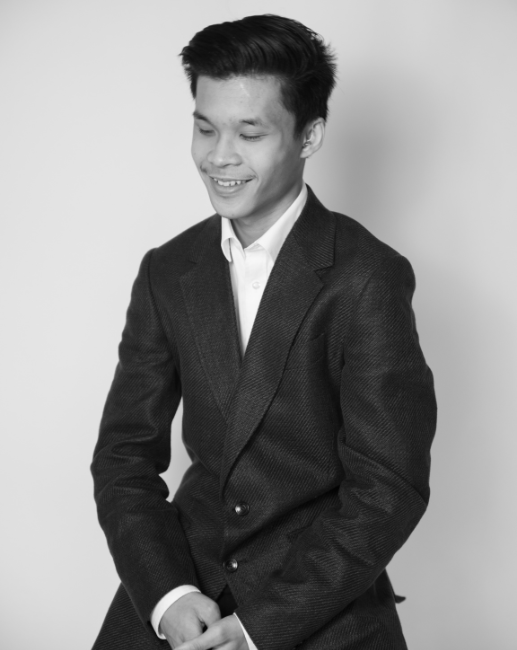
Stephen attended The Shepherd Centre from 2003 to 2005 after being diagnosed with severe bilateral hearing loss. He has been wearing hearing aids in both ears ever since. ‘I took part in intensive one-on-one Auditory-Verbal Therapy,’ says Stephen, ‘and remember loving almost every part of it. The lessons took place in a fun and lively environment.’ Now Stephen wants to follow in the footsteps of those who nurtured and taught him. He’s studying a Bachelor of Speech Hearing and Language Sciences at Macquarie University. His ultimate aim is to obtain a Masters in Clinical Audiology.
The seeds were probably sown early to become an audiologist. But it wasn’t a conscious decision until his later years in high school. ‘During those early years at The Shepherd Centre,’ he recalls, ‘I was learning how to speak without even knowing it. I can remember multiple playgroups, playing and riding around with other kids and having a great time. I think at the time, I didn’t appreciate just how influential my experiences back then were. I took my speech for granted for many years.’ He adds, ‘none of this would’ve been possible without The Shepherd Centre. I can safely say they not only laid the foundations for my speaking and listening skills but also sowed the seeds of opportunity. They’ve inspired me to go on and give the gift they have given me to the next generation. The work they do is truly inspiring.’
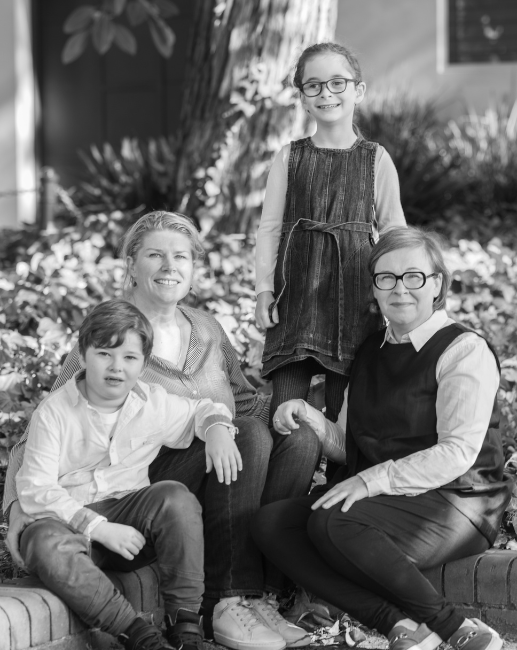
‘Beatrice didn’t pass her first SWISH (Statewide Infant Screening-Hearing) test,’ recalls Karen. ’We had the test another two times and were told Beatrice might be deaf. We had to wait three weeks before going to the Children’s Hospital, where we were told her hearing was okay but to keep an eye on it with regular checks, which we did. But the results were always inconclusive. Then when Beatrice turned four, it was only then we learned she had permanent bilateral hearing loss.’ Her parents managed to get her enrolled at The Shepherd Centre before she started school. ‘There was no history of hearing loss in the family and no known cause for Beatrice’s hearing loss, so it was really daunting at first. But when we came here to The Shepherd Centre, they normalised the experience.’
Beatrice continued to attend The Shepherd Centre after starting school to help with the improvement of her functional hearing and language development through the school-aged program. Because of her late diagnosis, she is still playing catch up, and the Centre wanted to give Beatrice the best possible chance for success. ‘The Shepherd Centre has given us the skills to understand the nature of hearing loss,’ says a grateful Karen. ‘We’re now working on Beatrice’s literacy skills. I really believe we’d be struggling to help Beatrice realise her full potential if it wasn’t for the interaction with The Shepherd Centre.’
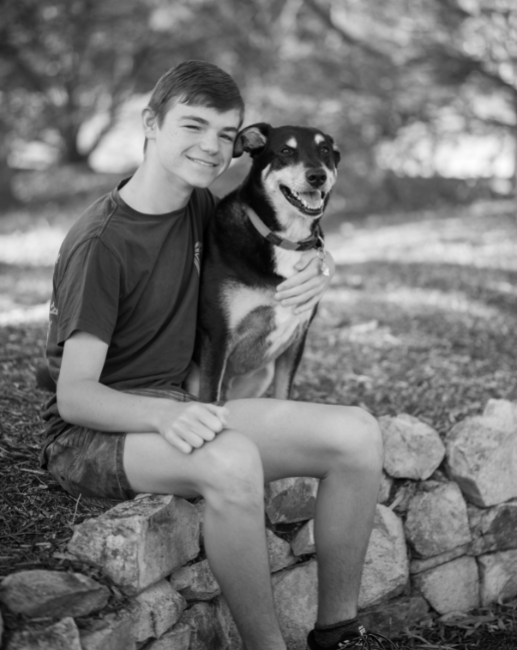
‘It took us a long time to discover the extent of Thomas’ hearing loss,’ explains mum Wendy. When he was born, we were told he had unilateral hearing loss, but not to be too worried. He was checked again at three months and at eight months, and the advice was the same.’ The advice Wendy got was incorrect. The Shepherd Centre firmly advises parents that ‘one ear is not enough’ and that children with unilateral hearing loss need specialist support. ‘It wasn’t until Thomas was 17 months old,’ recalls Wendy, ‘that we were told Thomas actually had bilateral hearing loss and would need hearing aids.’
Thomas was two years and two months old when he joined The Shepherd Centre. ‘The Shepherd Centre completed regular assessments of Thomas’ progress and provided feedback about how he was going,’ says Wendy. ‘This was reassuring and helped us set goals for learning.’ His family are proud of the progress Thomas has made. ‘We really appreciate The Shepherd Centre and the support they provided,’ says Wendy. ‘Having access to The Shepherd Centre’s Early Intervention Program was really important for him. It was also great for me, having that interaction with other mums. I was thirsty for knowledge at that time. And it was a good avenue for us both.’
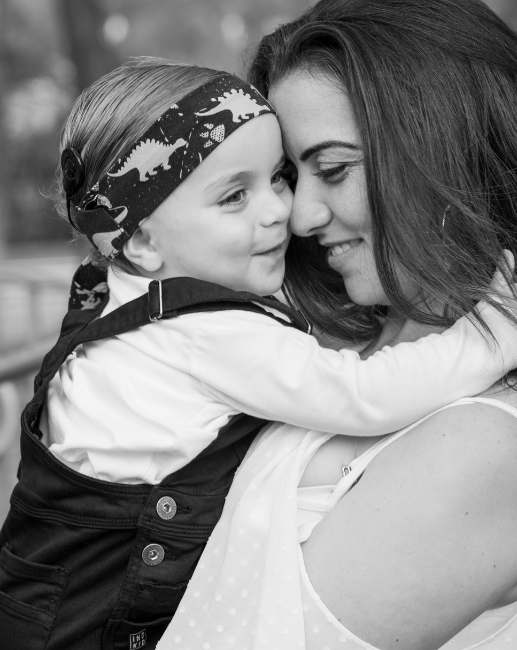
Jawad Khaled is nearly five years old. He was fitted with bilateral cochlear implants at the age of five months and experienced a whole new world. A world of sounds that his mother, Nadia, believes he could have easily missed out on, but for her own determination and the help of The Shepherd Centre. ‘It took nearly a month,’ recalls Nadia, ‘to have his hearing tested when he was born. I went home from the hospital with Jawad not having his hearing tested, and it played on my mind. I’m not sure why. Maybe it was some kind of sixth sense or just that I was conscious of the fact his hearing hadn’t been checked.’ The alarm bells hummed but nothing more. Her two other children could hear, and there was no history of hearing loss in the family. Finally, after an unexpected trip to the hospital, Jawad was diagnosed with profound hearing loss in both ears.
‘Once we had that confirmation,’ Nadia recalls, ‘I went in search for as much information as possible. Everyone, I mean everyone, recommended The Shepherd Centre. I found there was a centre close by at Casula near Liverpool. I made an appointment, and that changed our lives – in particular, it changed Jawad’s life. He’s speaking and listening as well as any child his age. He’s come such a long way and is now ready for a mainstream school. I felt so small when the hearing loss world entered into our lives. With the help of The Shepherd Centre, we’ve embraced it and are excited about the future for our son.’
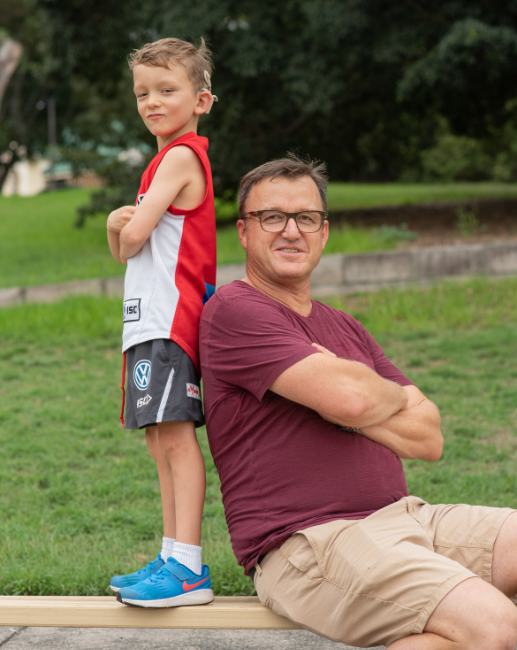
Leo was born prematurely, and parents David and Danielle spent the first eight weeks in neonatal intensive care. As a premature baby, Leo had been on breathing support, he had a hemorrhage on the brain, and his lungs had come apart from his rib cage. He overcame each one of those obstacles. Then as they were leaving the hospital six weeks after his birth, a nurse caught them and said, ‘Oh, one last thing, he failed the SWISH hearing test.’ It took another two weeks to have the diagnosis confirmed that Leo had moderate to severe hearing loss in both ears and was a candidate for cochlear implants. Despite meeting every challenge head-on, the decision to go ahead with the cochlear implants was arguably the toughest decision they had to make.
‘The Shepherd Centre didn’t push us – they just sowed the seed and diligently supported us through the decision-making process,’ explains David. ‘We talked to lots of other parents, even with parents who had decided against the implants and in hindsight wished they had gone ahead with the surgery when their child was younger.’ David and Danielle have experienced many wonderful moments with Leo since making that decision to have the surgery – interactions with his older brother, developing an appreciation of music and the relationships he’s developed with the extended family. ‘You should hear him now!’ says David. ‘He’s speaking Italian with a beautiful accent and is about to go on a school exchange holiday to Italy with a class of Italian native speakers.’
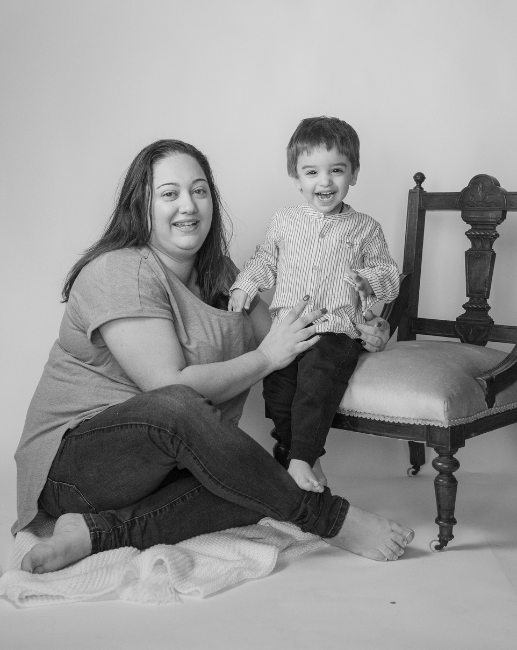
‘With his therapy, Logan is getting very cheeky,’ says local Camden resident Aisha, beaming with pride. ‘He knows what’s expected of him now and doesn’t wait for his therapist to make the sounds. He says them for her. After the SWISH test, we were referred to Hearing Australia. And that’s when we first heard of The Shepherd Centre. This is going to sound bad, but I didn’t really look at my options until Logan was nine months old. I wasn’t sure he was old enough, even though the pamphlets talked about early intervention. I was also dealing with all his other issues.’
Apart from his hearing loss, Logan was born with hydrocephalus, an accumulation of fluid on the brain, so there were many visits to the Sydney Children’s Hospital in Randwick. When Aisha arrived at The Shepherd Centre’s Liverpool Centre, those feelings of guilt were immediately put to rest. ‘I walked in and straight away felt the warmth and friendliness.’ The first few years have provided many highlights for Aisha. Her biggest test has been holding back the tears. ‘I think I’ve held myself back from crying more this year than I have in my entire life. My favourite moment would be the first time Logan turned back to his therapist and said, “Bye, Natalie,” as we were leaving.’
Aisha has lent her talent as a photographer to this photographic exhibition and the book that accompanies it, a labour of love capturing over 50 inspiring images and showcasing the stories of those impacted by The Shepherd Centre over the past 50 years.
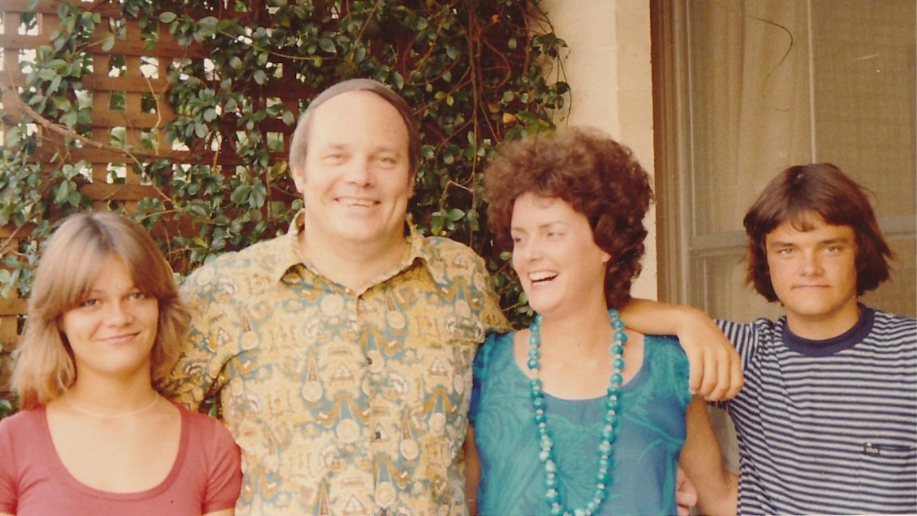
The Shepherd Centre emerged from the experiences of Annette and Bruce Shepherd. Their children, Penny and Daniel, born in the early 1960s, were discovered to be profoundly deaf. At that time, it was customary to send children who were deaf at the age of three or four to boarding schools. Keen not to send their children away, the Shepherds resolved to teach their children to speak and use their residual hearing assisted by hearing aids.
This decision was informed by their experiences at the Los Angeles based John Tracy Clinic, which taught pre-school children with hearing loss to speak and lipread and where parental involvement was encouraged. Annette observed Australian teachers implementing techniques similar to those of the John Tracy Clinic and thought that with added training, the teachers could become effective in teaching pre-school children who were deaf. Annette and Bruce felt that the only way to convince educators to adopt this approach was to establish their own educational program.
In early 1970, with the help of numerous friends, the Council for Integrated Deaf Education (CIDE) commenced a ground-breaking program of integrated education for five preschool-aged children who were deaf. Its educational philosophy was based on a speech Annette gave to the Preschool Teachers’ Association in 1969: ‘Both my husband and I had decided that as our two profoundly deaf children would, as adults, have to live in a world of hearing people, then the best way to equip them for this was to keep them part of it, from the very beginning.’ From little things, big things grow: this was the beginning of an organisation that would grow to serve over 1,000 families every year.
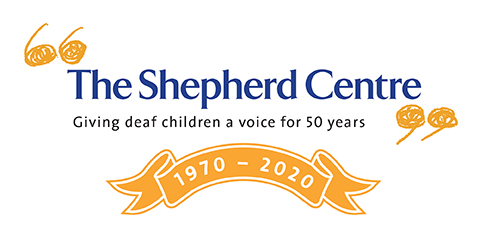
The Shepherd Centre acknowledge the traditional custodians of the lands where we work. We pay our respects to elders past and present.
In this discovery call, a specialist will:
Book your free 15-minute discovery call with one of our friendly specialists below.
Subscribe to our newsletter to stay up to date with everything happening at the Shepherd Centre.